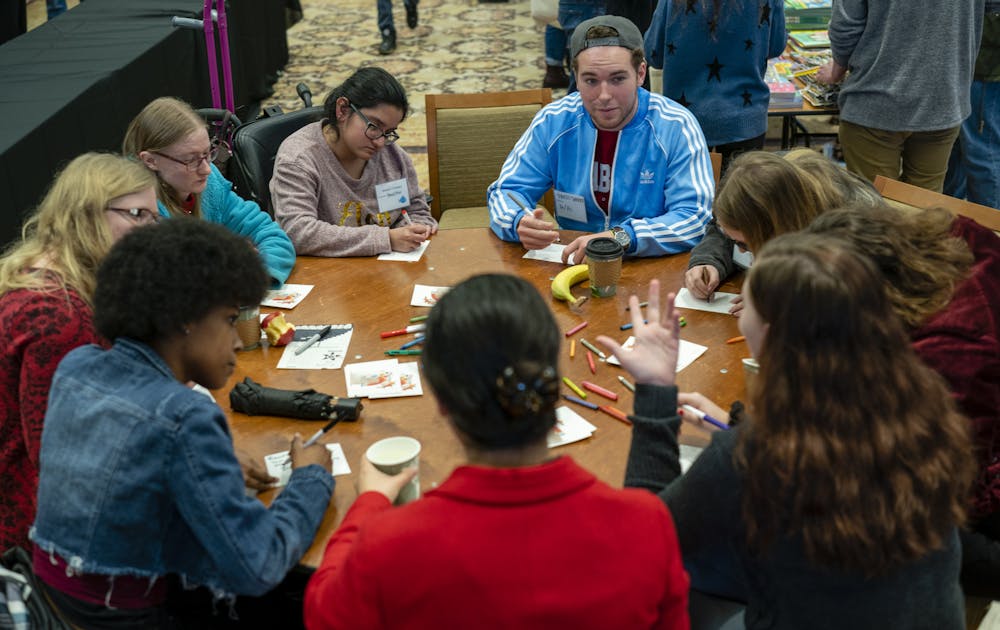Students from Elon University and other visiting campuses will gather to discuss and learn about interfaith and intersectional identities at the annual Ripple Conference, held from Feb. 17 to. 19 on campus. Sponsored by the Truitt Center for Religious and Spiritual Life, the schedule includes speakers, a panel, breakout sessions, a conference-wide art project and more.
Director of the Ripple Conference and Elon graduate student, Ivy Breivogel, said the 2023 conference will be centered around the theme of stretching the limits of religious identity.
“I think that there are different versions of religions for individual people,” Breivogel said. “I like to think of organized religions as templates for belief in our own systems and the theme this year comes from that idea.”
Breivogel put together the conference with the help of Elon students. The leadership team laid out a schedule, planned and updated the Ripple website with different events and breakout sessions for students to attend.
“None of us have run a conference, so it's been fun. All the leadership team is students; We meet weekly and the logistics are a kind of learning as we go,” Breivogel said.
Hillary Zaken, interim assistant dean of Multifaith Engagement and staff advisor for the Ripple Conference, said she is very excited and full of pride for the conference due to the hard work students have put into planning it.
“When we first came together, the students really weren't sure how to make this happen, but now they've hit their stride, and they're planning and they're doing,” Zaken said. “I'm really excited to listen to the conversations and see how students engage and learn with one another.”
Breivogel was inspired to join the leadership team after she went to the conference when she attended Warren Wilson College in 2019. In 2020, Breivogel was a community group leader, then in 2021, she joined the leadership team as a community group coordinator.
“Ripple gave me the language to articulate interfaith work,” Breivogel said. “It was feeling uncomfortable and not being sure about whether I belonged in a space like Ripple that made me want to come back and made me want to pursue a career in interfaith. I think that it’s important to recognize and name that discomfort.”
The Ripple Conference will begin with a Shabbat and buffet, followed by keynote speaker, Anthony Cruz Pantojas, the humanist chaplain at Tufts University. The following day, breakout sessions will surround a panel on reproductive justice across faith traditions, the conference wide art project and more. The conference will end with a service project.
Elon junior and public relations and social media marketing coordinator for Ripple, Sydni Brown, said she is most excited for the upcoming art project during the conference. Within the art project, students will be able to create zines — small circulated magazines filled with original content — with a university librarian Libby Coyner.
“I really like zines. They have a strong connection to the LGBTQ+ identities in the past and they are making a resurgence,” Brown said. “I'm excited to see what she does with that and how we can connect that to themes to the conference.”
Brown was involved with the Truitt Center when she originally heard about the Ripple Conference. When Brown learned more about the conference, she expressed interest in a leadership position, specifically enjoying the connections that the conference creates.
“I'm interested in the Ripple Conference because I'm really passionate about intersectionality, and I love having conversations about all the different intersecting identities and how that can create new identities,” Brown said. “I'm really interested and ready to connect with people and learn people's stories to be a more well rounded citizen.”
Since its start in 2016, the Ripple Conference has established itself as a safe place for all students of different backgrounds. The conference encourages students to engage with peers and broaden their horizons to understand how intersectional identities shape religious and spiritual identities as well as affect one's worldview.
“It's really easy to get stuck in the bubble of the school and it can be hard to break out of that bubble and to intentionally expose yourself to things that are different and I think that that's something that Ripple does really well,” Breivogel said. “Even if interfaith is not something a student is particularly interested in, building community and learning about religious diversity is a form of diversity, equity and inclusion, and I think it’s important that people are exposed to it.”


